News
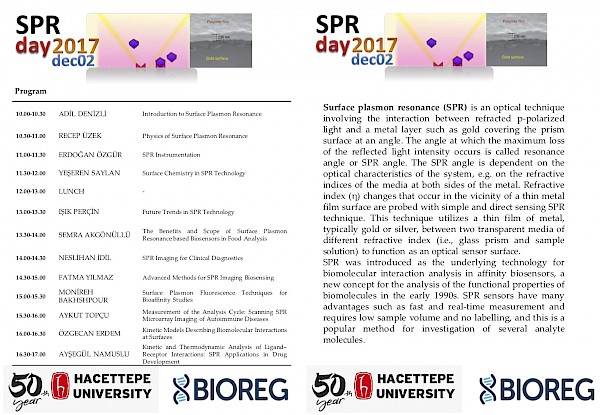
Saturday, December 2, 2017
SPR Nanoday 2017
BIOREG Araştırma Grubunun düzenlediği SPR Nanoday 2 Aralık 2017 cumartesi günü Hacettepe Üniversitesi, Kimya Bölümü konferans salonunda gerçekleştirildi. Yüzey Plazmon Rezonans yönteminin temel ilkeleri ve uygulamaları ile grubumuzun bu alandaki çalışmaları tüm gün süren bu etkinlikte ayrıntılı olarak tartışıldı.
…Read More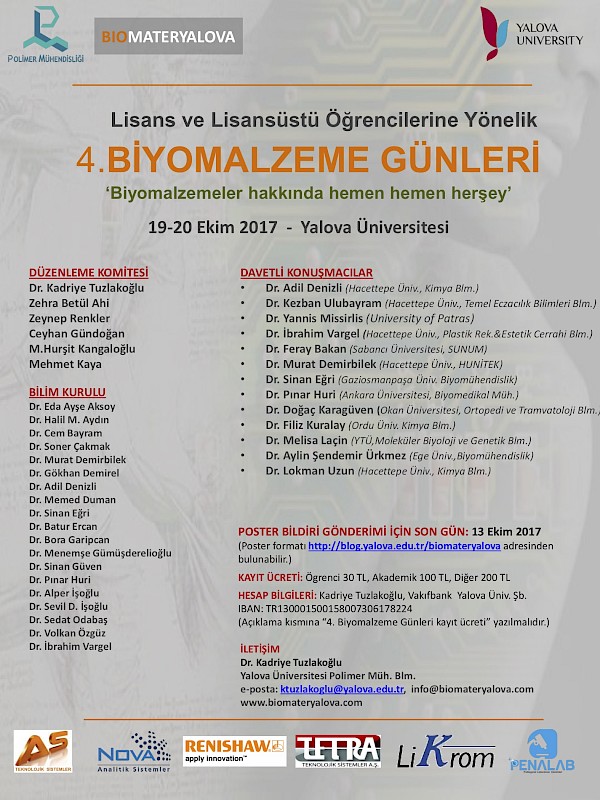
Sunday, October 22, 2017
4. Biyomalzeme Günleri Yalova Üniversitesi'nde Yapıldı
Yalova Üniversitesi Polimer Mühendisliği bölümü tarafından bu yıl 4’üncüsü düzenlenen Biyomalzeme Günleri alanlarında uzmanlaşmış bilim adamlarını bir araya getirdi.
Türkiye’nin alanındaki ilk ve tek bölümü olan Yalova Üniversitesi Polimer Mühendisliği Bölümü, Raif Dinçkök Kültür Merkezi’nde bu yıl dördüncüsü düzenlenen Biyomalzeme Günleri kapsamında alanında uzmanlaşmış bilim adamlarını ve Polimer Mühendisliği öğrencilerini buluşturdu.
…Read More
Sunday, October 22, 2017
4. Biyomalzeme Günleri Yalova Üniversitesi'nde Yapıldı
Yalova Üniversitesi Polimer Mühendisliği bölümü tarafından bu yıl 4’üncüsü düzenlenen Biyomalzeme Günleri alanlarında uzmanlaşmış bilim adamlarını bir araya getirdi.
Read More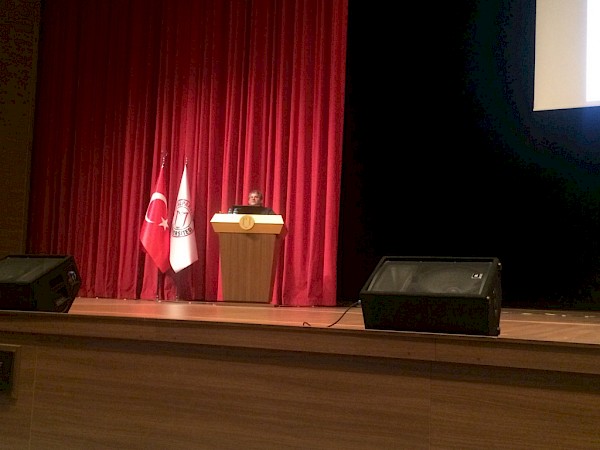
Monday, October 16, 2017
Muş’un İlk Bilim Şenliği ve Sergisi Sona Erdi
Muş Alparslan Üniversitesinin ev sahipliğinde DAP Bölge Kalkınma İdaresi Başkanlığı desteğiyle düzenlenen Bilim Şenliği ve Sergisi, iki günlük yoğun bir programın ardından sona erdi. Akademisyenlerin ve öğrencilerin yanı sıra Muş’taki ortaöğretim kurumlarının yüzlerce öğrencisinin ve eğitimcilerinin de katılım gösterdiği etkinlik, onlarca bağımsız bilimsel deneylere sahne oldu.
…Read More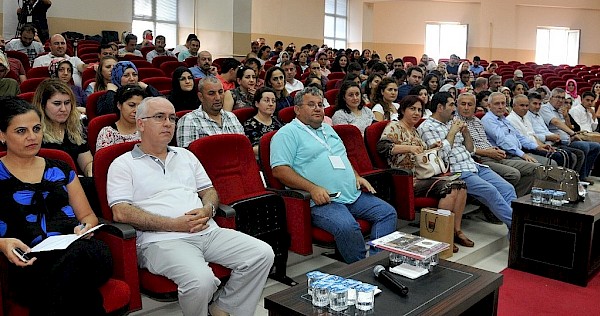
Thursday, October 5, 2017
TÜBA (Türkiye Bilimler Akademisi) Bilim Eğitimi Programı VI. Uygulamalı Bilim Eğitimi Kursu Gerçekleştirildi
TÜBA (Türkiye Bilimler Akademisi) Bilim Eğitimi Programı kapsamında; 2015 yılında Millî Eğitim Bakanlığı ile imzalanan iş birliği protokolü çerçevesinde temel bilimler öğretmenlerine yönelik “Uygulamalı Bilim Eğitimi Kursu”nun altıncısı, Samsun’da düzenlendi. Sorgulamaya dayalı öğrenme ve temel bilim eğitiminin etkinleştirilmesine katkı sağlamayı amaçlayan Kurs, 11-15 Eylül tarihleri arasında Samsun Ondokuz Mayıs Üniversitesi Eğitim Fakültesinde gerçekleştirildi.
…Read More
Thursday, October 5, 2017
TÜBA (Türkiye Bilimler Akademisi) Bilim Eğitimi Programı VI. Uygulamalı Bilim Eğitimi Kursu Gerçekleştirildi
Read More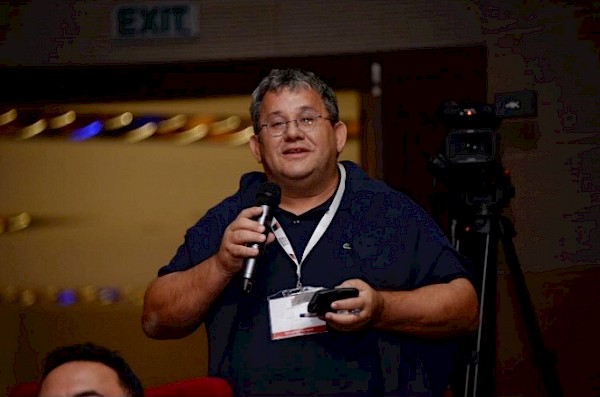
Thursday, October 5, 2017
TÜBA Üstün Başarılı Genç Bilim İnsanlarını Ödüllendirme Programı (TÜBA-GEBİP) Eylül Ayında Gerçekleştirildi
TÜBA Üstün Başarılı Genç Bilim İnsanlarını Ödüllendirme Programı (TÜBA-GEBİP) kapsamında ödüllendirilen üstün başarılı genç bilim insanlarının akademik çalışmalarının sunulması ve değerlendirilmesi ile bilim insanları ve kuruluşları arasındaki ilişki ve iş birliğini geliştirmeyi amaçlayan geleneksel TÜBA-GEBİP Yıllık Değerlendirme Toplantısı, Atatürk Üniversitesi ev sahipliğiyle 22-24 Eylül 2017 tarihlerinde Erzurum’da gerçekleştirildi.
…Read More

Thursday, October 5, 2017
TÜBA Üstün Başarılı Genç Bilim İnsanlarını Ödüllendirme Programı (TÜBA-GEBİP) Eylül Ayında Gerçekleştirildi
Read More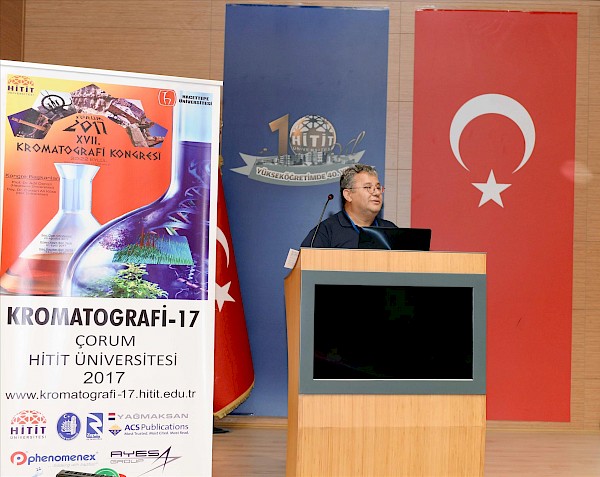
Thursday, October 5, 2017
XVII. Kromatografi Kongresi Gerçekleştirildi
Hitit Üniversitesi ev sahipliğinde düzenlenen XVII. Kromatografi Kongresi (Kromatografi-17) Meslek Yüksekokulunda başladı.
Gerçekleştirilen açılış törenine Rektör Prof. Dr. Reha Metin Alkan, Fen Edebiyat Fakültesi Dekan V. Prof. Dr. Emre Güler, Teknik Bilimler Meslek Yüksekokulu Müdürü Prof. Dr. Menderes Suiçmez, Kimya Bölüm Başkanı Prof. Dr. Faruk Gökmeşe, Kongre Başkanları Prof. Dr. Adil Denizli ve Doç. Dr. Dursun Ali Köse ile Hitit Üniversitesi öğretim elemanları ve çok sayıda konuk akademisyen katıldı.
…Read More